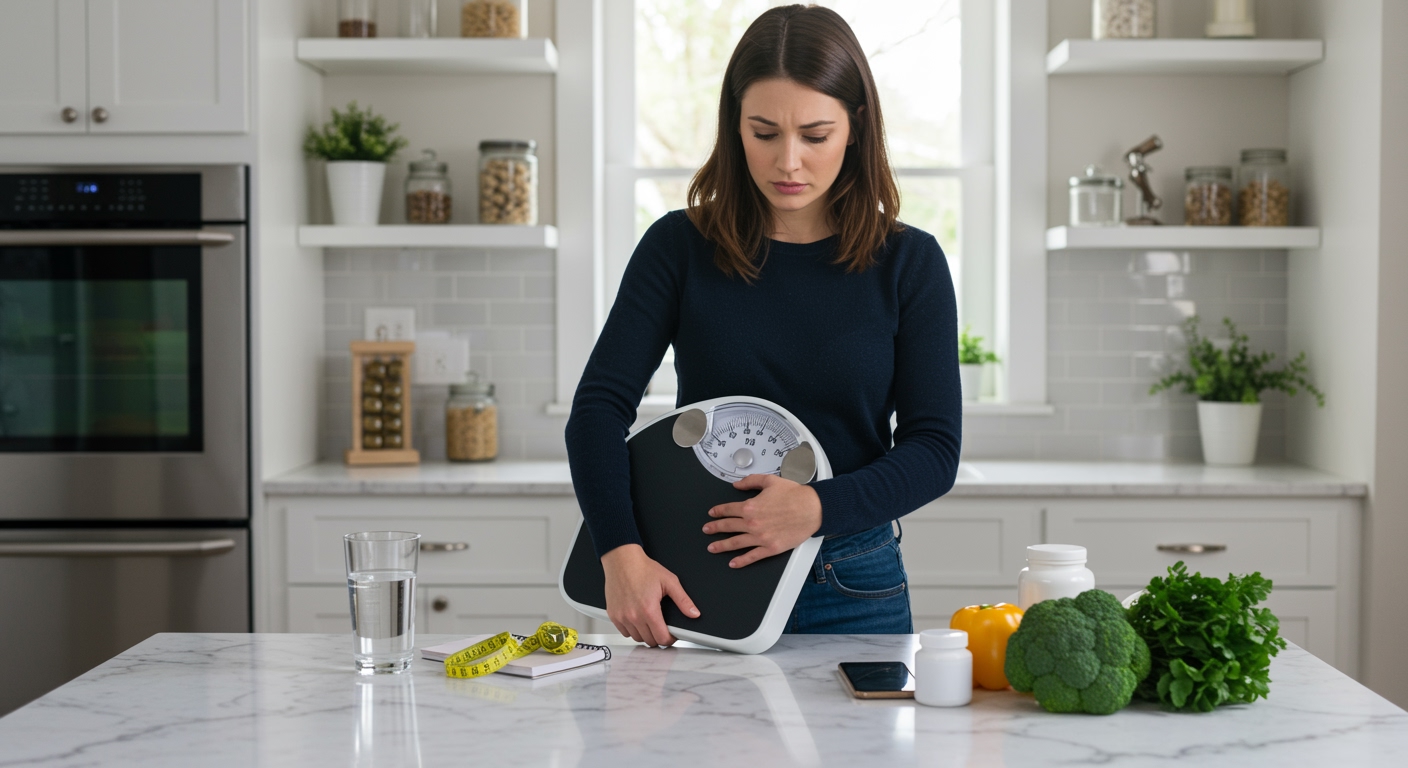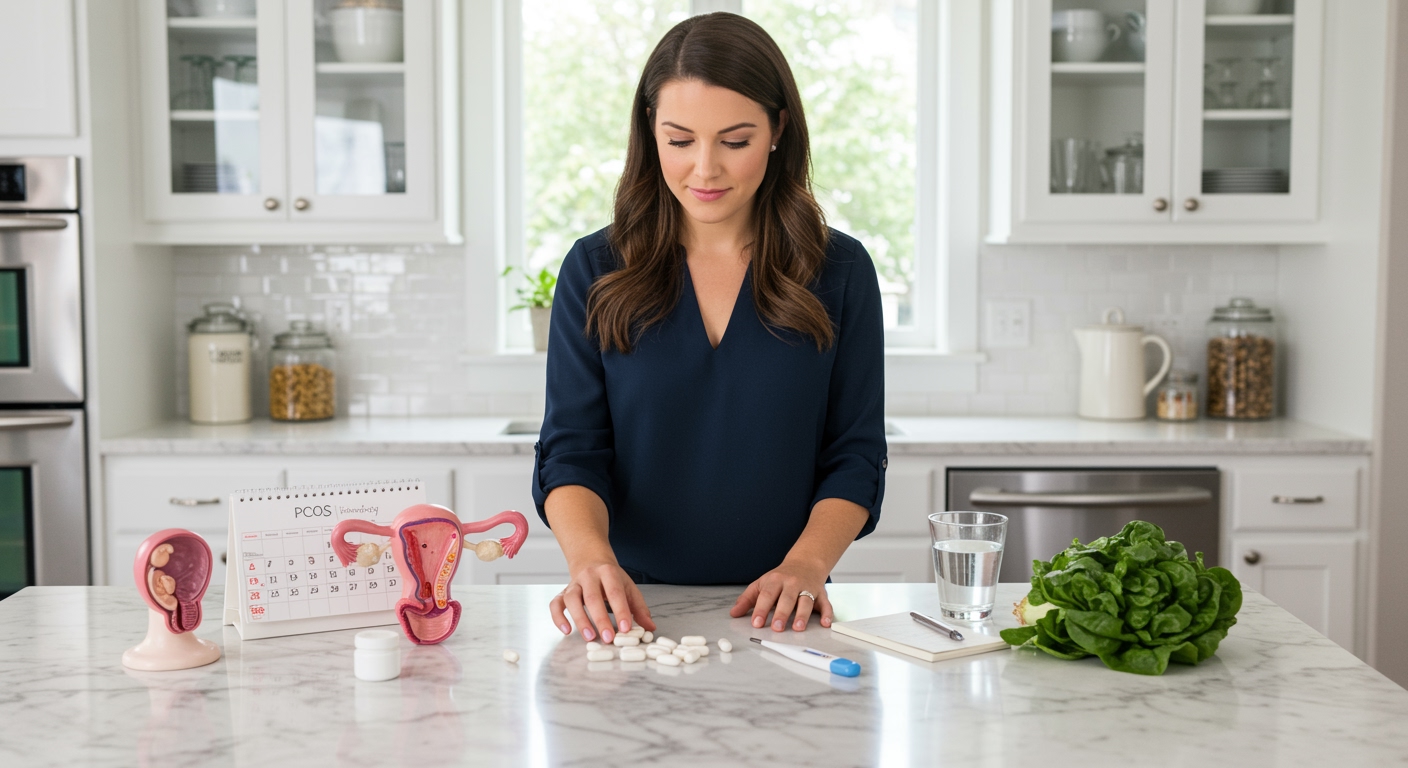✪ Key Takeaway: PCOS cannot cause true fat gain overnight, but it can trigger rapid water retention and bloating that mimics sudden weight gain.
Introduction
You step on the scale and gasp at the number staring back at you.
Five pounds heavier than yesterday, and you have PCOS, so your mind immediately races to the worst conclusions about your condition.
Hi, I am Abdur, your nutrition coach, and today I am going to explain the real truth about PCOS and overnight weight changes that will put your mind at ease.
What Actually Happens When You Gain Weight Overnight?
True fat gain requires consuming 3,500 calories above your maintenance needs to create one pound of body fat.
This means you would need to eat an extra 17,500 calories in a single day to gain five pounds of actual fat overnight.
Most people consume between 1,500 to 2,500 calories per day, making it physically impossible to gain multiple pounds of fat in 24 hours.
When your scale shows dramatic overnight increases, you are seeing water retention, food weight, and digestive contents, not fat storage.
Your body can hold several pounds of water depending on sodium intake, carbohydrate consumption, hormonal fluctuations, and digestive processes.
✪ Fact: Your body weight can fluctuate 2-5 pounds daily due to normal physiological processes unrelated to fat gain or loss.
How Does PCOS Affect Your Daily Weight Fluctuations?
PCOS creates hormonal imbalances that make your body more sensitive to weight fluctuations than women without the condition.
Elevated insulin levels in PCOS cause your body to retain more sodium and water, leading to increased bloating and scale weight.
High androgen levels disrupt your normal menstrual cycle, creating irregular hormonal patterns that affect water retention throughout the month.
Many women with PCOS experience insulin resistance, which makes their bodies store more glycogen and water in muscles and liver.
Each gram of stored glycogen holds approximately 3-4 grams of water, so carbohydrate intake can dramatically affect your scale weight.
PCOS also increases inflammation markers in your body, which can cause additional fluid retention and digestive bloating.
✪ Pro Tip: Weigh yourself at the same time each morning after using the bathroom and before eating for the most consistent readings.
What Triggers Sudden Scale Jumps With PCOS?
High sodium meals cause your body to retain extra water to maintain proper electrolyte balance, especially when you have PCOS.
Eating more carbohydrates than usual replenishes your glycogen stores, which automatically increases water storage in your muscles and liver.
Hormonal fluctuations during your cycle, even irregular ones with PCOS, can cause significant water retention and bloating.
Stress increases cortisol production, which works with insulin resistance to promote water retention and inflammation.
Constipation or slower digestion, common with PCOS, means more food weight sitting in your digestive system.
Certain medications used to treat PCOS symptoms can also contribute to fluid retention and temporary weight increases.
✪ Note: Restaurant meals often contain 2-3 times more sodium than home-cooked food, causing temporary water retention for 2-3 days.
How Can You Tell Real Weight Gain From Water Retention?
Real fat gain happens gradually over weeks and months, while water retention appears and disappears within days.
Track your weight for at least two weeks to identify patterns rather than focusing on daily fluctuations.
Take body measurements with a tape measure around your waist, hips, and arms to monitor actual body composition changes.
Pay attention to how your clothes fit, as true fat gain will make them tighter consistently, not just on certain days.
Notice if the weight increase coincides with eating out, consuming more carbs, or feeling stressed or bloated.
Water weight typically shows up in your face, hands, ankles, and abdomen as puffiness rather than firm tissue.
✪ Pro Tip: Focus on weekly weight averages rather than daily numbers to get a clearer picture of your actual progress.
What Should You Do When The Scale Jumps Overnight?
Take a deep breath and remember that overnight fat gain is physically impossible with normal eating patterns.
Drink plenty of water throughout the day to help your body release excess sodium and reduce bloating.
Continue following your normal eating routine instead of restricting calories or skipping meals in panic.
Focus on eating whole foods with moderate sodium content and avoid processed foods for a few days.
Get adequate sleep and manage stress levels, as both directly impact hormonal balance and water retention with PCOS.
Consider keeping a food and symptom diary to identify patterns between certain foods and scale fluctuations.
Remember that your worth and health progress are not determined by a single number on the scale.
✪ Fact: Studies show that daily weighing can increase anxiety and disordered eating behaviors, especially in women with hormonal conditions.
The Bottom Line
PCOS cannot cause true overnight fat gain, but it does make your body more prone to dramatic water retention and bloating that shows up on the scale.
Your scale weight is just data, not a judgment of your worth or progress, and understanding this difference will transform your relationship with weight management.
I would love to hear about your experiences with weight fluctuations and PCOS, so please share your thoughts or questions in the comments below.
References
At NutritionCrown, we use quality and credible sources to ensure our content is accurate and trustworthy. Below are the sources referenced in creating this article:
- Cleveland Clinic: Can Polycystic Ovary Syndrome Make You Gain Weight
- Frontiers in Endocrinology: PCOS and Weight Management
- PMC: Weight Management in PCOS
- Nature: PCOS Weight Gain Research





